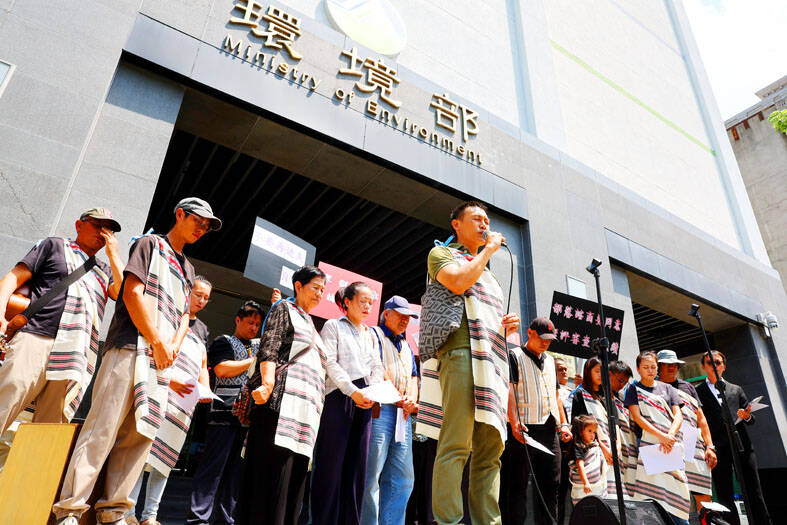A pumped storage hydropower construction project along the Dajia River (大甲溪) proposed by Taiwan Power Co (Taipower) should be suspended until consent is obtained from indigenous villages in accordance with regulations, H’rong Village representatives and environmental groups said at a protest in front of the Ministry of Environment in Taipei yesterday.
Taipower plans to build four pumped storage hydropower generators with a total installed capacity of about 610 megawatts, as well as a 10.6km headrace tunnel around the Dajia River in Taichung’s Heping District (和平), with the Deji Reservoir (德基水庫) and the Guguan Reservoir (谷關水庫) being the upper and lower reservoirs of the pumped storage hydropower system.
If approved by the environmental impact assessment (EIA) committee, a total of NT$60 billion (US$1.97 billion) would be granted to fund the project over a 10-year period.

Photo: CNA
As the project scope largely overlaps with H’rong Village’s traditional territory, the developer should have obtained consent from the village before it proceeded with the EIA, as required by Article 21 of the Indigenous Peoples Basic Act (原住民族基本法), Environmental Rights Foundation Taichung director Chung Han-shu (鍾瀚樞) said.
However, Taipower did not follow the procedure and based its decision on an official letter from the Heping District Office, which claimed “there is no relevant village” in the region, he said.
H’rong Tribal Council president Yulao O’bin said the village has filed an administrative appeal against the district office’s statement, urging the EIA committee to stop the project’s review.
H’rong Village resident Sulu Kwesi said that part of the project’s construction surplus is slated to be piled on a historic site of the village, where their ancestors used to live and hold festivals.
“That would bury our culture and history,” she said, adding that indigenous cultural exploration was not included in Taipower’s EIA report and the village’s voice remained unheard.
Environmental Rights Foundation attorney Yan Shih-cheng (顏士程) cited the Supreme Administrative Court as saying that construction projects must obtain consent from local indigenous villages as required by the act if the project is in traditional territory.
However, the district office considered the consent process unnecessary, simply because it is not close to the H’rong Village community, he said.
That did not align with court precedents or conform to the Council of Indigenous Peoples’ rules, Yan said.
At the EIA review meeting held at the ministry yesterday, the EIA committee expressed concern about the potential impact of the drilling and blasting method on the unstable geological structure around the project site.
The committee also asked the developer to conduct a more complete evaluation of potential air pollution, including fugitive dust caused by the construction and piled-up construction surplus.
Regarding the procedural issue of obtaining consent from relevant villages, the ministry’s Department of Environmental Protection said the EIA and indigenous consent procedure are separate.
No regulations mandate that indigenous consent must be obtained prior to the EIA review, it said.
The Taichung Environmental Protection Bureau asked the developer to consult more experts specializing in tunnel engineering and indigenous culture.
The committee advised the developer to revise the EIA report for further review.

UNILATERAL MOVES: Officials have raised concerns that Beijing could try to exert economic control over Kinmen in a key development plan next year The Civil Aviation Administration (CAA) yesterday said that China has so far failed to provide any information about a new airport expected to open next year that is less than 10km from a Taiwanese airport, raising flight safety concerns. Xiamen Xiangan International Airport is only about 3km at its closest point from the islands in Kinmen County — the scene of on-off fighting during the Cold War — and construction work can be seen and heard clearly from the Taiwan side. In a written statement sent to Reuters, the CAA said that airports close to each other need detailed advanced

Tropical Storm Fung-Wong would likely strengthen into a typhoon later today as it continues moving westward across the Pacific before heading in Taiwan’s direction next week, the Central Weather Administration (CWA) said. As of 8am, Fung-Wong was about 2,190km east-southeast of Cape Oluanpi (鵝鑾鼻), Taiwan’s southernmost point, moving westward at 25kph and possibly accelerating to 31kph, CWA data showed. The tropical storm is currently over waters east of the Philippines and still far from Taiwan, CWA forecaster Tseng Chao-cheng (曾昭誠) said, adding that it could likely strengthen into a typhoon later in the day. It is forecast to reach the South China Sea

Almost a quarter of volunteer soldiers who signed up from 2021 to last year have sought early discharge, the Legislative Yuan’s Budget Center said in a report. The report said that 12,884 of 52,674 people who volunteered in the period had sought an early exit from the military, returning NT$895.96 million (US$28.86 million) to the government. In 2021, there was a 105.34 percent rise in the volunteer recruitment rate, but the number has steadily declined since then, missing recruitment targets, the Chinese-language United Daily News said, citing the report. In 2021, only 521 volunteers dropped out of the military, the report said, citing

WEATHER Typhoon forming: CWA A tropical depression is expected to form into a typhoon as early as today, the Central Weather Administration (CWA) said yesterday, adding that the storm’s path remains uncertain. Before the weekend, it would move toward the Philippines, the agency said. Some time around Monday next week, it might reach a turning point, either veering north toward waters east of Taiwan or continuing westward across the Philippines, the CWA said. Meanwhile, the eye of Typhoon Kalmaegi was 1,310km south-southeast of Oluanpi (鵝鑾鼻), Taiwan’s southernmost point, as of 2am yesterday, it said. The storm is forecast to move through central